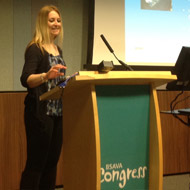Time for a more enlightened approach to clinical coaching

Alison said it was really important to set out expectations at the beginning of the work with a student.
"Better a willing volunteer than 10 pressed men," announced RVN, Alison Heywood, director of veterinary nursing at the College of West Anglia as she began her presentation on the role of a clinical coach at the BSAVA Congress in Birmingham.
She pointed out that whilst being a clinical coach can be seen as a role that is time-consuming and undervalued, there are some basic principles that, if fulfilled, will make it a positive experience.
Every person who puts themselves forward to be a clinical coach has undertaken extensive training to become either a veterinary nurse or a veterinary surgeon and has a wealth of experience to be shared. They should be used to stepping in if they see someone do something that is not quite correct or if they think there is a better way of doing it.
Alison said it was really important to set out expectations at the beginning of the work with a student. This should be a two-way process and, carried out in the early stages of the student's training, is time well spent. Having established the relationship, however, it was imperative to be consistent.
She said it is vital to say to students, "I am your clinical coach and not your parent", in order to impress on them that they are joining a profession and must be responsible for themselves and their work. You are, however, your student's best advocate and 'cheerleader' and could be working with them for two or three years.
Sometimes the relationship may be a difficult one but, as the clinical coach, you are the 'grown-up' and can use the situation to point out that this is something that happens in real life in practice and needs to be addressed. Be prepared to listen to students too ... and then listen some more, because they may have concerns or problems which they need to share.
Self-reflection is sometimes perceived as a major hurdle; but in reality veterinary nurses do it all the time and it should be relevant and natural in its style. It is about using experience to improve skills and move on professionally.
Alison concluded her advice by giving examples of questions that are frequently asked by students. The underlying theme running through her answers was one of pragmatism and occasional unorthodoxy.



 FIVP has shared a survey, inviting those working in independent practice to share their views on the CMA's proposed remedies.
FIVP has shared a survey, inviting those working in independent practice to share their views on the CMA's proposed remedies.